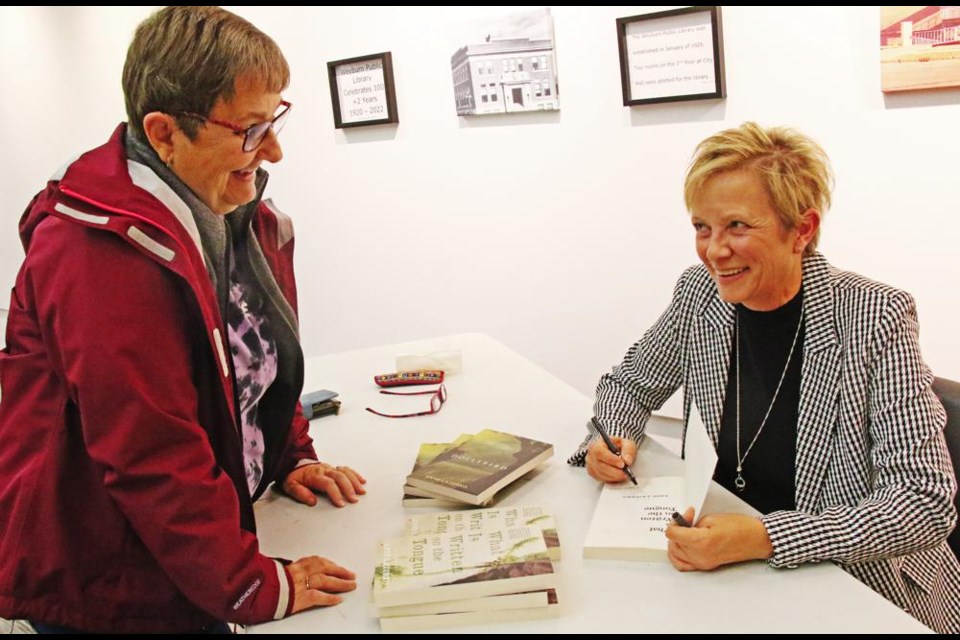WEYBURN – Weyburn author Anne Lazurko shared some of her personal experiences in research for her second novel, and attributed her trip to Indonesia with her sister as an important contributing factor to her writing.
Lazurko read excerpts from her book, “What is Written on the Tongue”, in a reading at the Weyburn Public Library on Wednesday evening, held as part of Sask. Library Week, and took questions from the audience.
The book follows the story of a Dutch man’s experiences during the Second World War in Holland under the Nazis, and then later in Indonesia as a member of the Dutch forces in that country.
Some of the stories her parents told of being under Nazi occupation formed a basis for that part of the story, and her father did serve in Indonesia, but the scenes in the novel in that country were not based on his experiences as he mainly had a desk job.
Lazurko said one of the main questions her character examines is whether the Dutch had become to the Indonesians what they had suffered under the Nazis during the Second World War.
To flesh out the details of the story she set in Indonesia, she took a research trip there to discover what the country and its people are like, and what the food and climate are like, as it’s very different from life in Saskatchewan.
Asked what she was looking for in Indonesia, Lazurko noted she had the plot outlined as to what and where certain events happened, but she wanted to see the actual location of these events, such as the city of Jakarta, the rainforest jungle, the port, and taste the food and smell the air.
Indonesia is an archipelago of islands, with Java being the main island where Jakarta is located.
“I wanted to see the port as well, and I wanted to see villages, and how they were set up … and I wanted to see jungle. Those are the things I wanted to experience, but I didn’t know how they would contribute to the novel,” said Lazurko. “It added whole new dimensions to the story.”
One place she saw was where two rivers converged, she said, noting it is a sacred spot. One river is slow and brown, the other has clear and strong running water, and they mix together after they converge.
“One is male and one is female, and they converge, taking the best of each other,” she said, and this was something she could use in her story, relating the concepts of good and bad, and questions like “what it takes to be a good man, and what it takes to be a balanced person.”
Lazurko said the visit there brought everything together for her.
“That’s what I was looking for, understanding the heat and the sun, the rashes and the bugs, all of that. Their feet literally rotted in their boots because of the heat,” she explained.
She noted that to this day, the Dutch don’t like to talk about that period of history, while the Indonesians glorify how their armed forces had a great victory over the Dutch. The truth is, she said, the Dutch simply left, and there was no big military defeat involved.
She talked to one older man who told her simply, “We don’t hold any grudges,” while younger people don’t really talk about that time at all as it was from the distant past.
Young people were interested in what she was doing visiting there, and why a white Canadian woman was writing about this time of long ago in their nation’s history.
“They were open about it, but it was almost like, ‘it doesn’t matter anymore’,” said Lazurko.
One search they did was for the grave site of an uncle, as her dad’s brother was a Franciscan monk in Indonesia and was buried there. She and her sister spent an extra day searching for it, and they found the grave marker.
“It was quite emotional, and exhausting, and that ended up being a part of the story too,” said Lazurko.
A recent development for her is that her first book, Dollybird, will now be re-published by Shadowpaw Press, a publishing company owned by former Weyburn resident Ed Willett. This was a pleasant surprise for her, she said, because the book’s original publisher, Coteau Books, has gone out of business.




